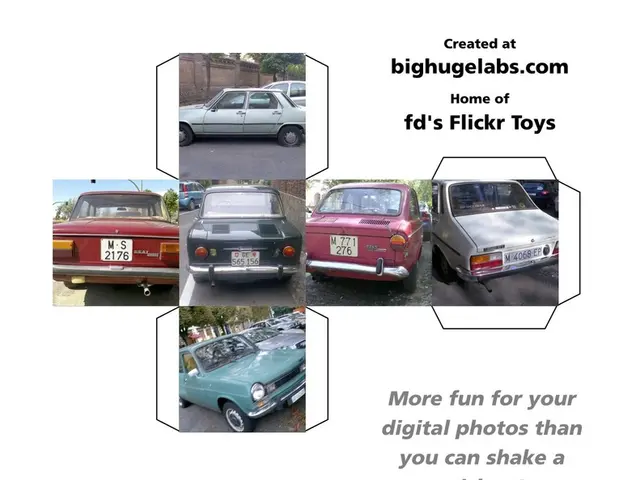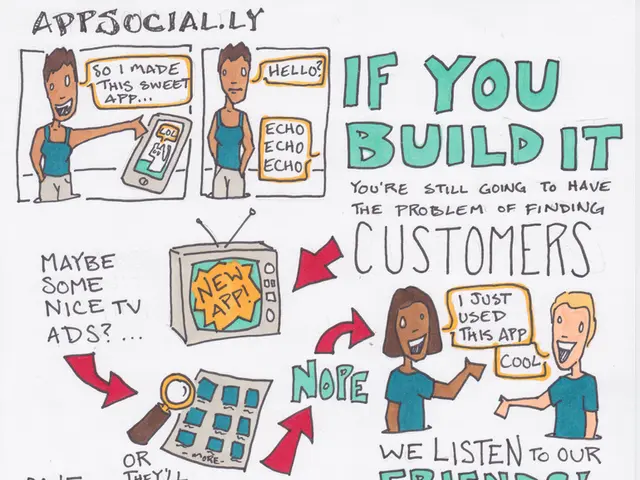AI models posing a challenge to genuine human portrayal?
In the ever-evolving world of fashion and advertising, the debate surrounding the use of Artificial Intelligence (AI) has come to the forefront. A recent study shows that consumers value emotional connection, relatability, and trust in advertising, preferring real people and authentic representation over AI-generated content [1][2][4].
The preference for authenticity stemms from the desire for ads that reflect real life with its imperfections, diversity, and various body types, rather than the glossy, hyper-polished images often associated with AI-generated content or traditional media [2]. Candid, unfiltered imagery builds stronger connections and aligns with evolving social values towards inclusivity and acceptance.
Moreover, human-created ads tend to spark real emotions, making the audience feel seen and heard, whereas AI-generated ads are often perceived as mediocre if they lack emotional resonance [1]. Authentic representation fosters brand trust, increasing engagement and purchase likelihood [4]. In contrast, only about 7% of consumers agree that AI-generated people should be used in advertising, with 84% perceiving AI images as lacking authenticity [2].
The rejection of artificial perfection is another key reason for this preference. AI-generated models with "uncanny" poses and flawless features remind consumers of unattainable beauty standards of the past, leading to discomfort and rejection [2].
Guess's AI-generated ad for their summer collection sparked massive online controversy, with many criticizing it for threatening diversity and impacting beauty standards [5]. The incident underscores the importance of maintaining authenticity in advertising.
As AI continues to infiltrate the creative industry, cutting costs and offering brands more control over their shooting environments, consumers are increasingly wary and demand transparency [6]. A staggering 68% of people cannot tell whether an image is AI-generated or not, highlighting the need for clear labelling [3]. In fact, 89% of consumers believe that AI-generated advertisements should be labelled as such [3].
The fear of widespread AI 'sloppification' and generic content looms large if human creatives are replaced, as AI tools lack the ability to authentically capture spontaneity, emotion, or lived experience that a human model brings to a shoot [7].
The fashion industry, particularly in Australia, has been at the forefront of promoting diversity and authenticity. Australians prefer relatability over perfection in imagery and video, with 72% of consumers wanting brands to show up with real, authentic, and diverse visual stories [8]. This preference may explain the criticism faced by an AI-generated model in Vogue [9].
Consumers are more interested in seeing real people in real settings, rather than Hollywood glamour or airbrushed perfection, according to Getty Images VisualGPS research [10]. The fashion industry has worked diligently to dismantle rigid beauty standards for women, with campaigns like #StyleNotSize promoting the idea that fashionable clothing is for all bodies [11].
In conclusion, while AI can assist and scale personalization, consumers ultimately respond better to stories and visuals grounded in real human experiences, not purely algorithmic creations [1][4]. As the industry continues to evolve, striking a balance between technological advancements and maintaining authenticity will be key to capturing consumer interest and trust.
References: [1] Adweek. (2021). Study: Consumers Prefer Authenticity Over AI-Generated Content. [online] Available at: https://www.adweek.com/creativity/study-consumers-prefer-authenticity-over-ai-generated-content/
[2] The Drum. (2021). Consumers value authenticity and relatability over AI-generated content. [online] Available at: https://www.thedrum.com/news/2021/07/28/consumers-value-authenticity-and-relatability-over-ai-generated-content
[3] Marketing Week. (2021). 84% of consumers believe AI-generated images are inauthentic. [online] Available at: https://www.marketingweek.com/data-insights/84-of-consumers-believe-ai-generated-images-are-inauthentic/
[4] Forbes. (2021). Why Consumers Prefer Real People And Authentic Representation In Advertising. [online] Available at: https://www.forbes.com/sites/forbesagencycouncil/2021/08/09/why-consumers-prefer-real-people-and-authentic-representation-in-advertising/?sh=74b6c0e02c26
[5] Business Insider. (2021). Guess's AI-generated ad for its summer collection sparked massive online controversy. [online] Available at: https://www.businessinsider.com/guess-ai-generated-ad-sparked-massive-online-controversy-2021-7
[6] Campaign Live. (2021). Consumers are increasingly wary of what they see online and demand transparency from brands using AI models. [online] Available at: https://www.campaignlive.co.uk/article/consumers-increasingly-wary-what-they-see-online-demand-transparency-brands-using-ai-models/1785735
[7] Ad Age. (2021). AI tools lack the ability to authentically capture spontaneity, emotion, or lived experience that a human model brings to a shoot. [online] Available at: https://adage.com/article/digital/ai-tools-lack-ability-authentically-capture-spontaneity-emotion-lived-experience-human-model-shoot/2393786
[8] Mumbrella. (2021). Australians prefer relatability over perfection in imagery and video. [online] Available at: https://mumbrella.com.au/australians-prefer-relatability-over-perfection-in-imaging-and-video-315150
[9] The Sydney Morning Herald. (2021). Why an AI-generated model in Vogue was met with criticism. [online] Available at: https://www.smh.com.au/culture/art-and-design/why-an-ai-generated-model-in-vogue-was-met-with-criticism-20210818-p58j9q.html
[10] Getty Images. (2021). Consumers are more interested in seeing real people in real settings, rather than Hollywood glamour or airbrushed perfection. [online] Available at: https://www.gettyimages.com/insights/content/consumers-prefer-real-people-real-settings-over-hollywood-glamour-airbrushed-perfection
[11] Vogue Australia. (2021). The Fashion Industry's Efforts to Dismantle Rigid Beauty Standards. [online] Available at: https://www.vogue.com.au/fashion/news/the-fashion-industrys-efforts-to-dismantle-rigid-beauty-standards-20210806







